人教版必修1 unit5教学设计
人教版高中英语必修一 教案: unit 5 Nelson Mandela--a modern hero Reading
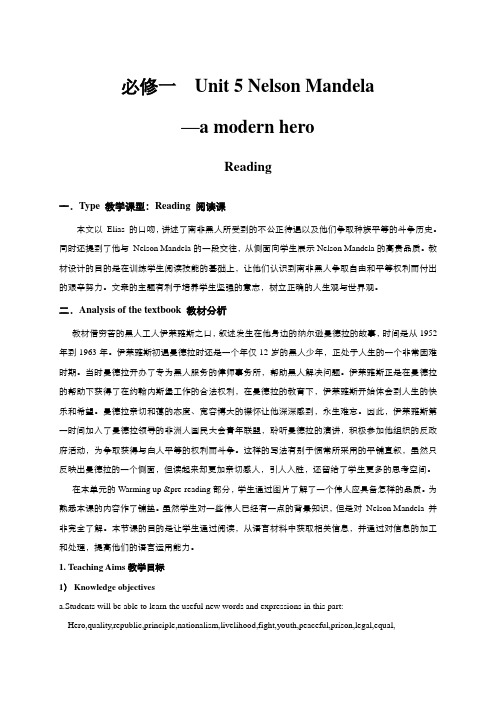
必修一Unit 5 Nelson Mandela—a modern heroReading一.Type 教学课型:Reading 阅读课本文以Elias 的口吻,讲述了南非黑人所受到的不公正待遇以及他们争取种族平等的斗争历史。
同时还提到了他与Nelson Mandela的一段交往,从侧面向学生展示Nelson Mandela的高贵品质。
教材设计的目的是在训练学生阅读技能的基础上,让他们认识到南非黑人争取自由和平等权利而付出的艰辛努力。
文章的主题有利于培养学生坚强的意志,树立正确的人生观与世界观。
二.Analysis of the textbook 教材分析教材借穷苦的黑人工人伊莱雅斯之口,叙述发生在他身边的纳尔逊曼德拉的故事,时间是从1952年到1963年。
伊莱雅斯初遇曼德拉时还是一个年仅12岁的黑人少年,正处于人生的一个非常困难时期。
当时曼德拉开办了专为黑人服务的侓师事务所,帮助黑人解决问题。
伊莱雅斯正是在曼德拉的帮助下获得了在约翰内斯堡工作的合法权利,在曼德拉的教育下,伊莱雅斯开始体会到人生的快乐和希望。
曼德拉亲切和蔼的态度、宽容博大的襟怀让他深深感到,永生难忘。
因此,伊莱雅斯第一时间加入了曼德拉领导的非洲人国民大会青年联盟,聆听曼德拉的演讲,积极参加他组织的反政府活动,为争取获得与白人平等的权利而斗争。
这样的写法有别于惯常所采用的平铺直叙,虽然只反映出曼德拉的一个侧面,但读起来却更加亲切感人,引人入胜,还留给了学生更多的思考空间。
在本单元的Warming up &pre-reading部分,学生通过图片了解了一个伟人应具备怎样的品质。
为熟悉本课的内容作了铺垫。
虽然学生对一些伟人已经有一点的背景知识,但是对Nelson Mandela 并非完全了解。
本节课的目的是让学生通过阅读,从语言材料中获取相关信息,并通过对信息的加工和处理,提高他们的语言运用能力。
1. Teaching Aims教学目标1)Knowledge objectivesa.Students will be able to learn the useful new words and expressions in this part:Hero,quality,republic,principle,nationalism,livelihood,fight,youth,peaceful,prison,legal,equal,law,advise,continue,gold,passbook,ANC,league,stage,vote,position,accept,violence,devote,vote, guidance, blow up, in troubleb. Enable the students to read Elias’ storyc. Guide the students to know the qualities of Nelson Mandela as a great leader2) Ability objectivesa.Develop the students ’reading skills, such as fast reading ,careful reading and summarizingb.Improve the students’ comprehension ability3) Emotion objectivesa,Understand the qualities great person have in common and learn the fine qualities from themb.Develop the students’ moral quality2.Teaching important points教学重点a.Enable the students to read Elias’ story and Learn to grasp the main idea of the text.b.Enable students to talk about the fine qualities of great people,especially Nelson Mandelac.Improve the students’ reading ability3.Teaching difficult points 教学难点a.How to grasp the main idea of the text.b.How to help develop students’ reading abilityc.How to help students learn from Nelson Mandela4.Teaching methods 教学方法a.Student-centeredb.Task-based teaching method(任务型教学)c.Discussion5.Learning methods 学习方法Individual or pair work and group work6.Teaching Aids 教具准备The multimedia三.教学设计1. 总体思路本堂课的主要内容分为四大部分,Pre-reading(阅读前活动) ,while –reading(阅读中活动),post-reading(阅读后活动)以及discussion(讨论) and role play 。
新人教版必修一Unit 5 Languages Around the World Grmmar教案

必修一Unit 5 Languages Around the World Grammar教案Learning aims:语言能力:主题:世界上的语言词汇:billion, native, attitude, reference, refer, system, despite, factor…语法:理解并运用关系副词when, where, why引导的定语从句;理解in/on/at which在定语从句中相当于when, where。
学习能力:运用寻读技巧快速找到阅读文本的相关信息;结合上下文理解词义。
文化意识:了解汉字的发展史,思考未来汉字的发展与使用;了解联合国的六种工作语言,从多角度思考外语学习的动机,积极探寻和思考语言学习的各种技巧和方法。
思维品质:通过观察语言和文化的发展,客观分析,辩证思考事物发展的因果关系;从多个视角认识世界,归纳与建构影响中国发展的多元因素。
Procedures:Step 1: lead-inOne language sets you in a corridor for life.Two languages open every door along the way.—— Frank Smith Step 2 Discovering Useful Structures of the Attributive Clauses定语从句Attributive Clause /Relative Clause1,定义:一个句子跟在一个名词或代词后进行修饰限定叫做定语从句。
按语法句式,定语从句在整个句子中做定语的成分。
被定语从句修饰的名词或代词叫先行词。
2,关系词分为:关系代词:who,whom,whose,which,that,as关系副词:when,where,why3,关系词的三大作用:连接作用;替代作用;成分作用。
It is the day when we went to school. 代替the day, 做时间状语。
Unit5+口语课教案 高中英语人教版(2019)必修第一册 (1)
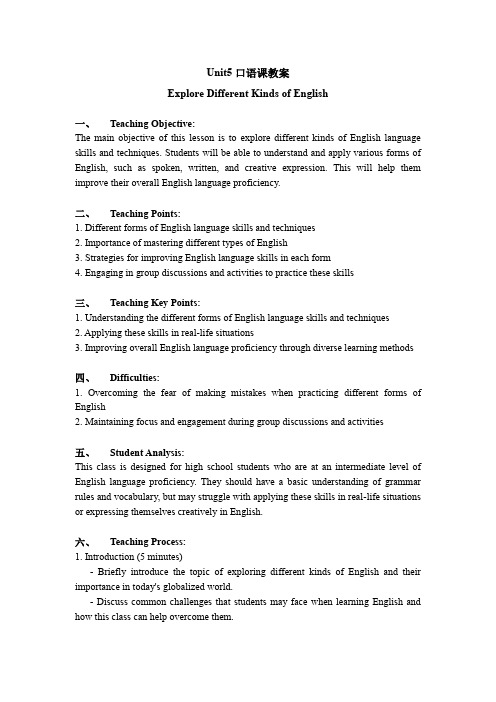
Unit5口语课教案Explore Different Kinds of English一、Teaching Objective:The main objective of this lesson is to explore different kinds of English language skills and techniques. Students will be able to understand and apply various forms of English, such as spoken, written, and creative expression. This will help them improve their overall English language proficiency.二、Teaching Points:1. Different forms of English language skills and techniques2. Importance of mastering different types of English3. Strategies for improving English language skills in each form4. Engaging in group discussions and activities to practice these skills三、Teaching Key Points:1. Understanding the different forms of English language skills and techniques2. Applying these skills in real-life situations3. Improving overall English language proficiency through diverse learning methods四、Difficulties:1. Overcoming the fear of making mistakes when practicing different forms of English2. Maintaining focus and engagement during group discussions and activities五、Student Analysis:This class is designed for high school students who are at an intermediate level of English language proficiency. They should have a basic understanding of grammar rules and vocabulary, but may struggle with applying these skills in real-life situations or expressing themselves creatively in English.六、Teaching Process:1. Introduction (5 minutes)-Briefly introduce the topic of exploring different kinds of English and their importance in today's globalized world.- Discuss common challenges that students may face when learning English and how this class can help overcome them.2. Formative Assessment (10 minutes)-Have students work in pairs to discuss their favorite ways to practice English (e.g., reading, writing, listening, speaking) and why they enjoy these activities.-Encourage students to share examples of how they have used English in their daily lives.3. Learning Objectives (15 minutes)-Introduce the different forms of English language skills and techniques (e.g., spoken, written, creative expression).-Discuss the benefits of mastering each form and how it can improve overall English language proficiency.- Provide examples of each form and discuss strategies for improving each skill.4. Application (20 minutes)-Break students into small groups and assign each group a specific form of English language skill or technique to explore (e.g., poetry writing, storytelling, debate).- Have students engage in group discussions and activities related to their assigned skill, using a variety of resources (e.g., books, articles, videos).- Encourage students to share their findings with the class and provide feedback on each other's work.5. Closing (5 minutes)- Review the key points covered in the lesson and emphasize the importance of practicing different forms of English in order to improve overall proficiency.- Ask students to reflect on what they learned in this lesson and what they plan to do differently moving forward to improve their English language skills.七、Homework:1. Write a reflection paper on the different forms of English language skills and techniques covered in the lesson. Discuss how you can apply these skills in your own life to improve your overall English language proficiency.2. Practice a new form of English language skill or technique outside of school by setting aside time each day to engage in the activity (e.g., reading a book in English, watching a movie without subtitles, joining an online forum to practice writing).3. Share your progress with your teacher or classmates by presenting your reflection paper or sharing your experiences practicing a new form of English language skill or technique.。
最新人教版高中英语必修一unit5《nelsonmandela》全单元教案.doc
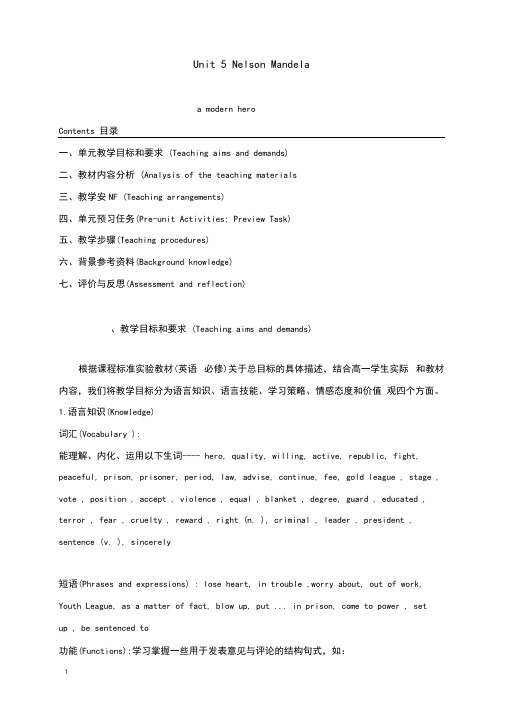
Unit 5 Nelson Mandelaa modern heroContents 目录一、单元教学目标和要求(Teaching aims and demands)二、教材内容分析 (Analysis of the teaching materials三、教学安NF (Teaching arrangements)四、单元预习任务(Pre-unit Activities: Preview Task)五、教学步骤(Teaching procedures)六、背景参考资料(Background knowledge)七、评价与反思(Assessment and reflection)、教学目标和要求(Teaching aims and demands)根据课程标准实验教材(英语必修)关于总目标的具体描述,结合高一学生实际和教材内容,我们将教学目标分为语言知识、语言技能、学习策略、情感态度和价值观四个方面。
1.语言知识(Knowledge)词汇(Vocabulary ):能理解、内化、运用以下生词---- hero, quality, willing, active, republic, fight, peaceful, prison, prisoner, period, law, advise, continue, fee, gold league , stage , vote , position , accept , violence , equal , blanket , degree, guard , educated , terror , fear , cruelty , reward , right (n. ), criminal , leader , president , sentence (v. ), sincerely短语(Phrases and expressions) : lose heart, in trouble ,worry about, out of work, Youth League, as a matter of fact, blow up, put ... in prison, come to power , setup , be sentenced to功能(Functions):学习掌握一些用于发表意见与评论的结构句式,如:1. 发表意见(Giving opinions )Why do you think so? What do you think of …? What's you opinion?agree / don't agree. I think / don't think .... I prefer .... In myopinion ....I'm afraid ....2.评论(Making comments)Good idea! That's an excellent idea .语法(Grammar):定语从句(II )(由where, when, why, 介词+ which, 介词+ whom引导的定语从句)The school where I studied only two years was three kilometres awayThis was a time when you had got to have a passbook to live in JohannesburgThe reason why I got a job was because of my hard work .•••we were put in a position in which we had either to accept we were less important, or fight the Government .The person to whomyou should be grateful for a peaceful South Africa is Nelson Mandela.扩展词汇:negative(消极的),heroine(女主角,女主人公),unwilling(不情愿的),nation(国家,民族),sacrifice(牺牲),realize (认识到),give up (放弃),riches (财富),Bible (圣经),revolution (革命),career (职业),equality (平等),fairness(公平),conflict (冲突),biography (自传),beliefs (信仰),Christianity (基督教),religion (宗教),priests (牧师),version (翻译),readable (易读的),adventure (冒险),scholar (学者),sympathy (同情),,campaign (从事活动),communist (共产主义者),injustice (不公平),oppose (反对),pilot(飞行员) , boycott (联合抵制)2.语言技能(Skills)听:在本单元的课文及练习册听力教学中,能听懂人物和事件以及它们的关系,能抓住所听语段中的关键词,正确理解话语间的逻辑关系。
英语人教版高中必修一 教案Unit 5 Discovering Useful Structures

Unit 5 Languages Around the WorldPeriod 3 Discovering Useful Structures教材分析本节课为语法课,主题为“描述你喜欢的事物”(Describe your favorite things)。
教学内容为限制性定语从句和关系副词when,where,why,介词+which的用法。
首先,通过观察上一课时“Reading and Thinking”课文中出现的句子,要求学生归纳限制性定语从句中关系副词的用法。
接着,通过完成单句填空、语篇填空等练习帮助学生更加熟练地掌握限制性定语从句中关系副词的用法。
最后,通过真实语境,进行语言输出。
利用定语从句准确表达自己的喜好,描述最喜欢的人、物、时间、地点、原因等。
教学目标在本课学习结束时,学生能够:1. 观察和归纳限制性定语从句中关系副词when,where,why,介词+which的用法。
2. 运用定语从句的语法知识,理解语境、语篇意义。
3. 运用定语从句表达看法和描述喜好。
教学重难点【教学重点】1. 掌握限制性定语从句中关系词的用法。
2. 理解含有限制性定语从句的语篇。
【教学难点】运用定语从句,准确描述喜好。
教学过程Step 1 Warming-up1. When does written Chinese language date back to?2. What is longgu?Step 2 ObservingRead the sentences from the passage and underline the restrictive clauses.设计意图:学生观察句子,复习限制性定语从句,找到由关系副词引导的限制性定语从句。
Step 3 Grammar SummaryRead the grammar notes on P110 and P111.设计意图:讲解课后P110-P111的语法要点,学习关系副词引导的限制性定语从句。
人教必修一Unit5_Reading_for_Writing_名师教学设计
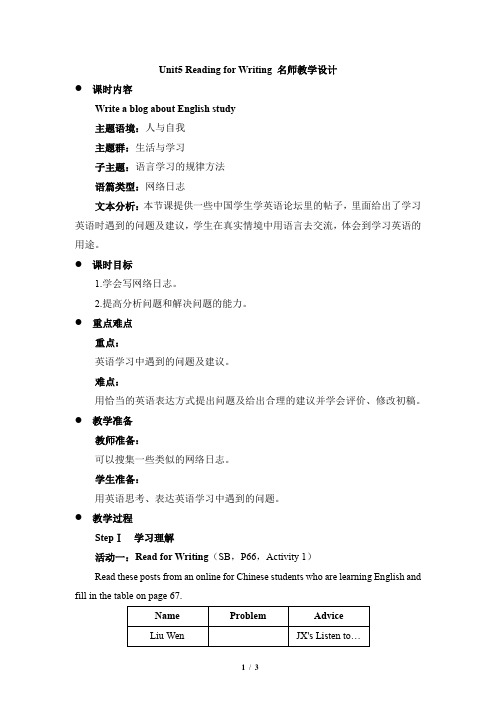
Unit5 Reading for Writing 名师教学设计●课时内容Write a blog about English study主题语境:人与自我主题群:生活与学习子主题:语言学习的规律方法语篇类型:网络日志文本分析:本节课提供一些中国学生学英语论坛里的帖子,里面给出了学习英语时遇到的问题及建议,学生在真实情境中用语言去交流,体会到学习英语的用途。
●课时目标1.学会写网络日志。
2.提高分析问题和解决问题的能力。
●重点难点重点:英语学习中遇到的问题及建议。
难点:用恰当的英语表达方式提出问题及给出合理的建议并学会评价、修改初稿。
●教学准备教师准备:可以搜集一些类似的网络日志。
学生准备:用英语思考、表达英语学习中遇到的问题。
●教学过程StepⅠ学习理解活动一:Read for Writing(SB,P66,Activity 1)Read these posts from an online for Chinese students who are learning English and fill in the table on page 67.【设计意图】在Read for Writing环节中,设计了一个活动,让学生上网查找一些中国学生学英语论坛里的帖子,从中获取ideas,本次写作的主要内容就是根据相应的问题提出建议。
Step Ⅱ应用实践活动二:Work in groups. List your problems in learning English and brainstorm some useful advice.(SB P67,Activity2)语言支架:I don't know how to…I have no idea how/what……is a big difficulty for me.My biggest problem is…I Cannot.I (also) have trouble with…You might try…It's very important to…This worked for me…Problem:e.g. I cannot understand the teacher's English in class. …Advice:…【设计意图】通过搭建语言支架,学生能用正确的句式将自己的想法表达出来,其中有表达问题的句式,也有给出建议的句式。
人教版高中英语必修一教案Unit 5 Nelson Mandela (含答案)
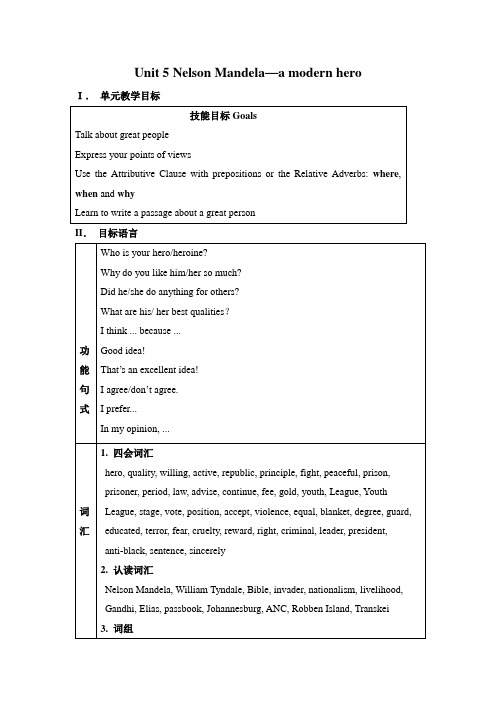
Unit 5 Nelson Mandela—a modern hero I.单元教学目标II.目标语言III. 教材分析和教材重组I. 教材分析本单元以Nelson Mandela —— a modern hero 为话题,目的在于使学生了解一个伟大的人应具备怎样的品质,学会表达自己的观点,并用所学的句型来描写一个伟人。
1.1 Warming Up列出一些形容词让学生判断一下哪些可以用来描述伟大的人,一个伟大的人应具备怎样的品质。
1.2 Pre-reading给学生提供了六个名人的图片,要求利用图片下面标注的人物的重要事迹以及学生对他们的了解,来判断这六个人谁是伟人,谁是重要的人但不是伟人。
1.3 Reading介绍Elias的生平,向学生展示Nelson Mandela是一个怎样的人。
这是一篇记叙文,让学生学会利用时间顺序描述一个人一生的主要活动。
1.4 Comprehending练习1和3帮助学生利用判断正误和时间顺序来整体理解课文。
练习2和4要求学生进一步了解课文细节。
1.5 Learning about Language分词汇和语法两部分。
其中Discovery useful words and expressions是根据课文语境在运用中掌握词汇,Grammar是有关关系副词where, when, why以及“介词+关系代词”引导定语从句的用法,并通过练习加以巩固。
1.6 Using Language分为三部分,一是Listening,练习听力可配合P72的Listening Task进行。
二是Reading,这也是一篇精读文章,更详细地了解曼德拉。
三是Writing,要求利用时间顺序简要地描述一个人。
2. 教材重组2.1 因本教材重点强调的是阅读能力,故将Reading, Comprehending,Using Language 中的Reading合在一起设计成一节“阅读课”(一)(精读课)。
人教版高中英语必修一Unit 1-Unit 5全英说课稿

人教版高中英语必修一Unit 1-Unit 5全英说课稿引言本文旨在介绍人教版高中英语必修一Unit 1-Unit 5的授课方法和教学内容。
本套教材是高中英语必修课程中的一部分,内容涵盖了日常对话和基本语法知识,是高中英语研究的基础。
Unit 1: Friendship- 阅读理解:通过互动讨论和小组活动,学生了解和掌握友谊的重要性,以及如何在青少年时期建立和维持朋友关系。
- 写作:学生将研究如何写一封友谊的信,通过语言表达感情和分享重要时刻,增进彼此之间的理解。
Unit 2: English Around The World- 阅读理解:学生将了解英语在全球的使用情况,了解英语的进化历程和相关文化俗。
- 写作:学生将研究如何写一篇议论文,就英语在当今世界中的地位和作用发表自己的观点。
Unit 3: Travel journal- 阅读理解:通过阅读游记和旅行日记,学生将扩大英语词汇量和了解不同的文化和历史。
- 写作:学生将研究如何写一篇旅行日记,描述自己的旅行经历和感悟,提高英语写作的能力。
Unit 4: Amazing Science- 阅读理解:学生将了解科学发展的历史,以及人类对自然的探索和解释;学会如何从科学文章中获取信息。
- 写作:学生将研究如何写一篇科普短文,介绍感兴趣的科学领域的最新进展。
Unit 5: Music- 阅读理解:学生将了解音乐的历史和文化,掌握音乐相关的词汇和概念。
- 写作:学生将研究如何写一篇关于音乐的文章,和同学分享自己对音乐的喜好和见解。
结论本文介绍了人教版高中英语必修一Unit 1-Unit 5的授课方法和教学内容,通过丰富的教学活动和提高英语写作能力,全面提升学生的英语水平和综合素质。
【教案】Unit+5Listening+and+speaking+教学设计人教版高中英语必修第一册
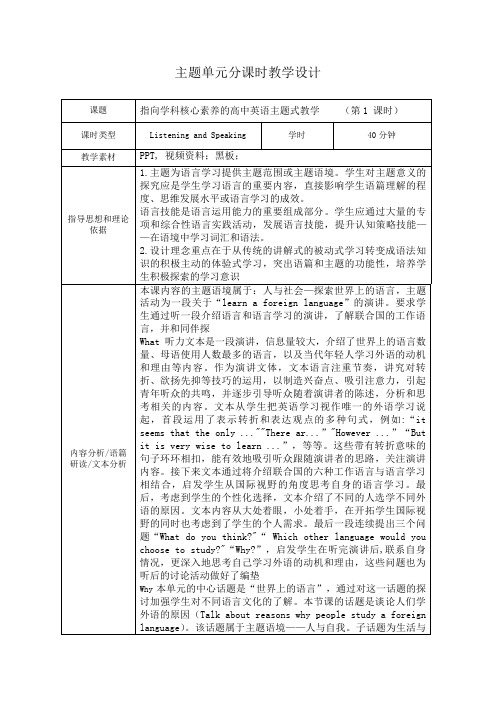
主题单元分课时教学设计课题指向学科核心素养的高中英语主题式教学 (第1 课时)课时类型Listening and Speaking学时40分钟教学素材PPT, 视频资料;黑板;指导思想和理论依据1.主题为语言学习提供主题范围或主题语境。
学生对主题意义的探究应是学生学习语言的重要内容,直接影响学生语篇理解的程度、思维发展水平或语言学习的成效。
语言技能是语言运用能力的重要组成部分。
学生应通过大量的专项和综合性语言实践活动,发展语言技能,提升认知策略技能——在语境中学习词汇和语法。
2.设计理念重点在于从传统的讲解式的被动式学习转变成语法知识的积极主动的体验式学习,突出语篇和主题的功能性,培养学生积极探索的学习意识内容分析/语篇研读/文本分析本课内容的主题语境属于:人与社会—探索世界上的语言,主题活动为一段关于“learn a foreign language”的演讲。
要求学生通过听一段介绍语言和语言学习的演讲,了解联合国的工作语言,并和同伴探What听力文本是一段演讲,信息量较大,介绍了世界上的语言数量、母语使用人数最多的语言,以及当代年轻人学习外语的动机和理由等内容。
作为演讲文体,文本语言注重节奏,讲究对转折、欲扬先抑等技巧的运用,以制造兴奋点、吸引注意力,引起青年听众的共鸣,并逐步引导听众随着演讲者的陈述,分析和思考相关的内容。
文本从学生把英语学习视作唯一的外语学习说起,首段运用了表示转折和表达观点的多种句式,例如:“it seems that the only ...""There ar...”"However ...”“But it is very wise to learn ...”,等等。
这些带有转折意味的句子环环相扣,能有效地吸引听众跟随演讲者的思路,关注演讲内容。
接下来文本通过将介绍联合国的六种工作语言与语言学习相结合,启发学生从国际视野的角度思考自身的语言学习。
高中英语人教版(2019)必修第一册Unit 5 Reading for writing 教学设计
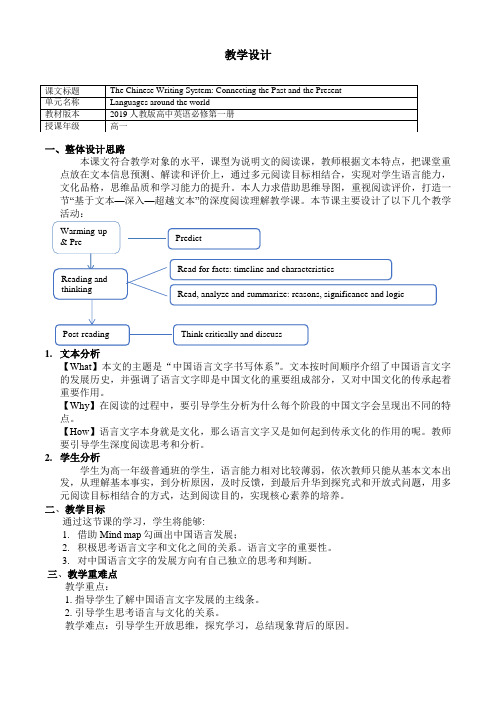
教学设计一、整体设计思路本课文符合教学对象的水平,课型为说明文的阅读课,教师根据文本特点,把课堂重点放在文本信息预测、解读和评价上,通过多元阅读目标相结合,实现对学生语言能力,文化品格,思维品质和学习能力的提升。
本人力求借助思维导图,重视阅读评价,打造一节“基于文本—深入—超越文本”的深度阅读理解教学课。
本节课主要设计了以下几个教学活动:1. 文本分析【What 】本文的主题是“中国语言文字书写体系”。
文本按时间顺序介绍了中国语言文字的发展历史,并强调了语言文字即是中国文化的重要组成部分,又对中国文化的传承起着重要作用。
【Why 】在阅读的过程中,要引导学生分析为什么每个阶段的中国文字会呈现出不同的特点。
【How 】语言文字本身就是文化,那么语言文字又是如何起到传承文化的作用的呢。
教师要引导学生深度阅读思考和分析。
2. 学生分析学生为高一年级普通班的学生,语言能力相对比较薄弱,依次教师只能从基本文本出发,从理解基本事实,到分析原因,及时反馈,到最后升华到探究式和开放式问题,用多元阅读目标相结合的方式,达到阅读目的,实现核心素养的培养。
二、教学目标通过这节课的学习,学生将能够:1. 借助Mind map 勾画出中国语言发展;2. 积极思考语言文字和文化之间的关系。
语言文字的重要性。
3. 对中国语言文字的发展方向有自己独立的思考和判断。
三、教学重难点教学重点:1. 指导学生了解中国语言文字发展的主线条。
2. 引导学生思考语言与文化的关系。
教学难点:引导学生开放思维,探究学习,总结现象背后的原因。
课文标题 The Chinese Writing System: Connecting the Past and the Present 单元名称 Languages around the world 教材版本 2019 人教版高中英语必修第一册 授课年级 高一Warming-up & Pre-reading PredictReading and thinkingPost-reading Read for facts: timeline and characteristics Think critically and discuss Read, analyze and summarize: reasons, significance and logic四、教学过程教学环节教学活动设计意图核心素养培养目标时间安排Warming up&Pre-reading 1. T shows pictures of theorigins of the human writtenlanguages.2. T asks the Ss what theyexpcect to know about theChinese writing system.1. 利用图片,创设情境,引入话题, 激活学生已有的认知和经验,并激发学生对于文本探索的愿望;2.词汇学习,为文本理解做铺垫。
人教版高一英语必修一unit5教学设计

教材分析人教版高一年级上册必修1,Unit5, Nelson Mandela---a modern hero 的第一课,这是一节高中阅读课。
教材上这一部分主要分为四个部分:第一部分为warming up。
编者在这部分列出了很多描写人物品种的词,有褒义的也有贬义的,目的是想通过问题引导学生思考判断哪些形容词可以用来描述a great person。
第二部分是六张不同的人物图片,并附以他们的简介,主要的活动是让学生讨论if they were / are great man.由于第一、二部分联系比较紧密,活动设置也比较好,但我觉得这两部分的活动顺序可以调整一下,即把第二部分放在前面,先呈现图片和简介以引起学生注意力和兴趣,以图片展示的形式激励学生用英语进行语言实践活动,然后归纳出hero的一个模糊标准,为阅读活动做好铺垫。
然后再让他们自己说出他们所认为的a great person 所拥有的品质,这样可能更符合学生的思维习惯特点,并且有利于调动他们的积极性和培养他们说语言的能力。
因此,我决定吧第一、二部分结合在一起作为pre-reading 部分来讲,但顺序做一下调整,之后是正式人物曼德拉的登场,进入主题Alias眼中的曼德拉,重点把Nelson Mandela 挑出来,附加更多关于他的信息,稍加重点地呈现,因为他的信息与接下来的reading passage 联系非常紧密,我想通过重点呈现关于他的信息来提高给学生更多background information,帮助他们更好地理解reading text.第三部分是一个关于Elias’ Story 的reading text,属于人物传记式的阅读,但是文章的写作角度比较特别,由穷苦的黑人工人Alias叙述他眼中的曼德拉,这样的写法比较客观可信。
Alias的故事与遭遇同时也成为本文与本课的一条贯穿总线,也是这堂课的中心阅读任务。
学生要做的主要活动就是阅读并理解文章的内容和大意,同时注意一些重点细节信息的把握。
【教案】Unit+5Reading+for+writing+教学设计人教版高中英语必修第一册
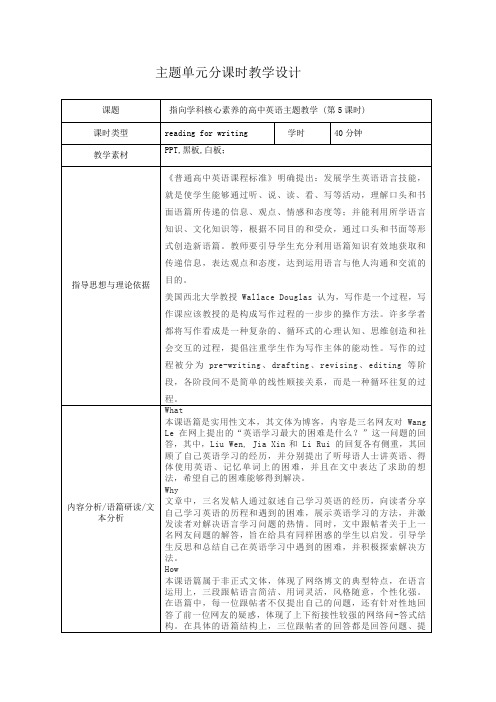
主题单元分课时教学设计课题 指向学科核心素养的高中英语主题教学 (第5课时)课时类型reading for writing学时40分钟教学素材PPT,黑板,白板;指导思想与理论依据《普通高中英语课程标准》明确提出:发展学生英语语言技能,就是使学生能够通过听、说、读、看、写等活动,理解口头和书面语篇所传递的信息、观点、情感和态度等;并能利用所学语言知识、文化知识等,根据不同目的和受众,通过口头和书面等形式创造新语篇。
教师要引导学生充分利用语篇知识有效地获取和传递信息,表达观点和态度,达到运用语言与他人沟通和交流的目的。
美国西北大学教授Wallace Douglas认为,写作是一个过程,写作课应该教授的是构成写作过程的一步步的操作方法。
许多学者都将写作看成是一种复杂的、循环式的心理认知、思维创造和社会交互的过程,提倡注重学生作为写作主体的能动性。
写作的过程被分为pre-writing、drafting、revising、editing等阶段,各阶段间不是简单的线性顺接关系,而是一种循环往复的过程。
内容分析/语篇研读/文本分析What本课语篇是实用性文本,其文体为博客,内容是三名网友对Wang Le在网上提出的“英语学习最大的困难是什么?”这一问题的回答,其中,Liu Wen, Jia Xin和 Li Rui 的回复各有侧重,其回顾了自己英语学习的经历,并分别提出了听母语人士讲英语、得体使用英语、记忆单词上的困难,并且在文中表达了求助的想法,希望自己的困难能够得到解决。
Why文章中,三名发帖人通过叙述自己学习英语的经历,向读者分享自己学习英语的历程和遇到的困难,展示英语学习的方法,并激发读者对解决语言学习问题的热情。
同时,文中跟帖者关于上一名网友问题的解答,旨在给具有同样困惑的学生以启发。
引导学生反思和总结自己在英语学习中遇到的困难,并积极探索解决方法。
How本课语篇属于非正式文体,体现了网络博文的典型特点,在语言运用上,三段跟帖语言简洁、用词灵活,风格随意,个性化强。
人教版选择性必修一Unit 5 Reading and Thinking 教案

Unit 5 A Pioneer for All People---reading and thinking教学设计文本分析主题语境:人与自然(粮食危机的与农业生产)语篇类型:记叙文(人物介绍类)【what】作者较客观介绍了我国著名农业科学家袁隆平的伟大而平凡的一生。
文章人他对于自我身份认识开始讲起,他认为自己是一个道地的农民。
他在大学毅然决然地选择了农业作为自己的专业。
在大学学习期间,尽管遇到了许多困难,他仍然坚持发展杂交水稻,做了许多研究,终于成功地种植出了杂交水稻。
他在事业上的成功为他带来了巨额财富,但是他没有沉迷于这小小的成功,他把钱捐给了国家农业发展,自己也投身到了超级杂交水稻的研究中。
他一生致力于让中国人不挨饿,让世界人民不会因为饥饿死亡,他做到了。
【why】文章通过走进袁隆平,认识并了解他的事业和理想的发展过程,一是让学生们学习他的奉献精神,科学苦干精神,个人前途与祖国利益相结合的时代选择;二是了解中国科学家在解决世界粮食问题中做出了艰苦的尝试并且取得了巨大的贡献和成就。
希望能使学生能有所感悟,并结合自身的真实情况和当今中国的需要,以及当代世界格局进行有益的思考和探所。
【How】篇章结构:这篇文章以时间为线,从袁隆平的出身讲起,依次介绍了他的教育,研究,成就,美德以及他的理想和愿景,从而在 who, what(how),why 三个方面证明了袁隆平是当之无愧的人类的先锋楷模。
文本语言:本文使用第三人称,采用过去时描述袁生平,用现在时展现他的品质,尽量客观地展示了袁隆平人生的各个方面。
其中作者也使用了客观地Activity 4 (7mins)Summarize the text.1.How is the article developed?2.What are the values behind the storyof Yuan?。
人教版高中英语必修1Unit5NelsonMandela—amodernhero教案
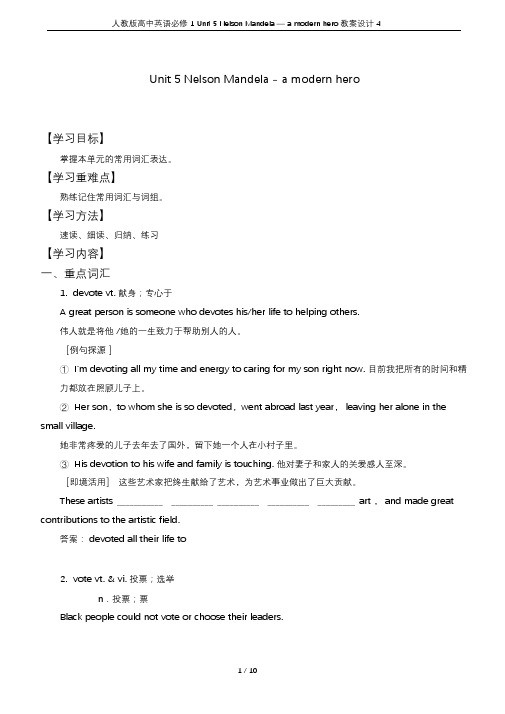
Unit 5 Nelson Mandela - a modern hero【学习目标】掌握本单元的常用词汇表达。
【学习重难点】熟练记住常用词汇与词组。
【学习方法】速读、细读、归纳、练习【学习内容】一、重点词汇1.devote vt. 献身;专心于A great person is someone who devotes his/her life to helping others.伟人就是将他/她的一生致力于帮助别人的人。
[例句探源]①I'm devoting all my time and energy to caring for my son right now. 目前我把所有的时间和精力都放在照顾儿子上。
②Her son,to whom she is so devoted,went abroad last year,leaving her alone in the small village.她非常疼爱的儿子去年去了国外,留下她一个人在小村子里。
③His devotion to his wife and family is touching. 他对妻子和家人的关爱感人至深。
[即境活用]这些艺术家把终生献给了艺术,为艺术事业做出了巨大贡献。
These artists ___________ __________ __________ __________ _________ art ,and made great contributions to the artistic field.答案:devoted all their life to2.vote vt. & vi. 投票;选举n.投票;票Black people could not vote or choose their leaders.当时黑人没有选举权,他们无权选择他们的领导人。
[例句探源]①Did you vote for or against her? 你投了她的赞成票还是反对票?②We will listen to the arguments on both sides and then vote on it. 我们将先听听双方的论点,然后再表决。
人教版高中英语必修一-Unit-5教案

Unit 5 Nelson Mandela——a modern hero教材分析:本单元以Nelson Mandela —— a modern hero为话题,目的在于使学生了解一个伟大的人应具备怎样的品质,学会表达自己的观点,并用所学的句型来描写一个伟人。
提示:1、本单元从warm-up开始,到最后的writing,都是以第三人称的角度来进行描述的,因此,教学中要注意这种人称的前后一致,否则无法前后一致的引导学生进行学习和表达。
2、Reading部分侧重于理解,以及理解基础上的summary,这为最后的writing做好的铺垫和积累(尤其是关键单词、句型和结构的积累),最后的writing要是前面阅读后的仿写(当然能力较强的学生也可以不受限制的开展写作)。
3、如何激发学生学习关于这些伟人的文章,是需要教师思考的:这些伟人学生会感兴趣吗?学生了解多少关于这几位伟人的伟大业绩?从哪些角度来导入会让学生更加的感兴趣?4、教学目标建议增加:通过学习文章和相关素材,进一步了解伟人的生平事迹,尤其是如何才能成为伟人。
培养学生初步使用相关词汇、句型和文章结构进行人物生平描述的口语表达和基础写作能力。
Teaching aims:1. To arouse Ss’ interest in learning about heroes in history2. To develop Ss’ listening and speaking ability.Teaching procedures:Step1 warming up●Describe yourselvesFirst what kind of person are you? (shy, outgoing, fun, mean, immature, nice, kind, honest, brave, loyal, happy, wise, smart, friendly, warm, cheerful, popular, generous, hard-working, diligent, weak, stupid, lazy, dishonest, tense, cold, unkind, miserable, dull, strong-minded, determined etc.)●Discussion (Encourage students to give five or six qualities that they think greatpersons have, and give their reasons.)提示:What kind of great persons? Politicians, scientists, or? Different kinds of great persons, different qualities.Question 1: Who do you think are the greatest men in your mind? Can you name some?Question 2: In what way do you consider a man is a great? What is your standard?●Look at page 33 and then ask the Ss if these famous people are great people.●Conclusion:A great person is a person who has followed his or her ideas and sacrificed(牺牲) something so that they could be realized. A pop singer may be very popular with the young people, but he/she is not a great man/woman.A famous person may be well-known but if he or she has not gone through struggles and difficulties for their noble aims, they can not be called a great person.Step2 language points:1.devote vtoneself to 献身于、致力于。
2019版人教统编高中英语必修第一册全册教案教学设计(Unit1-5)
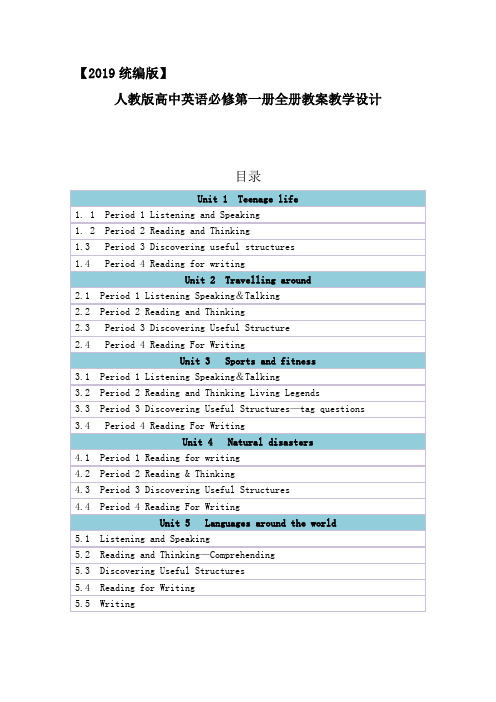
【2019统编版】人教版高中英语必修第一册全册教案教学设计目录1.1 Period 1 Listening and Speaking教学目标与核心素养:1. Let students master the useful words and expressions about school clubs and ways to express their hobbies or interests2. Let students briefly understand functions of different clubs and be aware of the ways of choose a suitable club.3. Get students to practice grasping topics and details while listening a dialogue.4. Get students to talk about topics relating to campus clubs.教学重难点:Importance:1. Get students to practice grasping topics and details while listening a dialogue.2. Get students to talk about topics relating to campus clubs.Difficulty:Guide the students to combine the topic with useful expressions about interests and preferences, and express themselves freely .课前准备:1.Ask the students to make preparations in vocabulary and phrases related to the theme of the period.2.Help the students to finish the Guided Learning Plan教学过程:Step 1Warming upActivity 1Ask Ss to match the photos with the names of the clubs. And hold a brief discussion about what the students are doing in the clubs.Step 2 Listening (1)Activity 2Guide the students to listen to the first two conversations and choose the correct answers.Remind the students to pay attention to the Predict Content:“Before you listen, you can read the questions and choices. It will help you topredict what you will hear.”1.What are they learning about in Conversation 1 ?(A)A. HearingB. SoundsC. Dogs.2.The students are discussing_____ in Conversation 2.(C)A. school workB. relationshipsC. dating.3.Circle the two clubs where these two conversations happened. (A)(D)A. Science ClubB. Ballet ClubC. Nature ClubD. Debate ClubActivity 3Guide the students to listen to conversation3. Then finish the following exercise.1. Tick the activities that happen in each club.Ballet Club Nature Club Cartoon Club Volunteer Clublearn new movements listen to lectures watch cartoons help old peoplewatch dance programs grow plants writes stories clean up parksmake Ballet clothes work in a greenhouse draw cartoons give directions.2. Adams says that he likes ___________but is not so interested in _________ .(B)A. stories, cartoonsB. animals, plantsC. making friends, cleaning up.3. Which club do you think is suitable for Adam? Why?I think Adam should join the Volunteer Club because he likes to do something outdoors.Step 3 SpeakingActivity 4Organize the students to working pairs and help each other choose a school club.Make some preparations before pair work.Brainstorm USEFUL WORDS and EXPRESSIONS FOR THE PAIR WOWRK. Are you going to join …?. I’d like to…, but I am not sure….. Which club do you like to join?. Have you decided which club to join?. My dream is to be……. …is not for me.. I like …,but I am not so interested in….…Provide an example for the students to modify.EXAMPLEA: Hi, Sam! I've decided to join the Music Club.B: Good decision!A: How about you? Are you going to join a club?B: Yes I'm wondering which one I should choose:the Act Club or the Ballet Club?A: I guess the question is… Do you like dancing better than acting?B: Actually, I like acting better, but my friends go to the Ballet Club and I want to be with them.A: Hmm…If you ask me,I think you should choose what you like.Step 5 PronunciationActivity 5Listen and repeat.Guide the students to listen and pay attention to the combinations of lettersEncourage the students to add more words to each groupProvide help whenever necessary.al talk, wall, ball,fall,call, all…ay pay, stay, delay, day, may, play, display, away…ai paint, daily, gain, pain, hailstone, wait…are care, declare, dare, prepare, spare, scare…ar bar, hard, car, star, large, enlarge…er her, prefer, teacher, farmer, paper …ir bird, circus, circle, ,third, thirsty, fir, birthday, shirt, dirty……or horse, absorb, bore, door, story…or word, work…ur burn, hurt, fur, turn, nurse, turtle, purple…ee keen, tree, fee, seem, feet, teeth…ea clean, eager, teach, leave, speak…ea head, ready, bread, weather, sweater, heavy…ear clear, appear, fear, hear, dear, near, ear, …ear earn, heard, search, learn, earn, earth…oa boat, coach, coat, goat, load, …ow show, grow, low, blow, slow, follow, eyebrow……ow now, shower, town, down, how, tower…ou out, loud, about, loud, doubt, mouth, house, mouse…ore more, bored, forecast, forehead, core…2. Guide the students to listen to the proverbs and repeat. Notice the pronunciation of the letters in bold.1. The early bird catches the worm.2. Always prepare for a rainy day.3. Actions speak louder than words.4. All work and no play makes Jack a dull boy.5. Distance tests a horse’s strength. Time reveals a person's character.Period 2 Reading and Thinking教学目标与核心素养:1. Let students master useful words and phrases related to the text;2. Let students understand the challenges Adam meets in his new schooland compare the similarities and differences of their school and Adam’s;3. Help the students finish vocabulary exercises in the text book.4. Get students to understand they should learn to face difficultiesand challenges in senior high school for their own future.教学重难点:Importance:Help the students to master key words and phrases in the text.Guide students to compare school life in different places.3. Guide the students to learn about Adam’s school life and understand that everyone should overcome difficulties in a new situation.Difficulty:Guide the students compare their school life and Adam’s, and discussways to deal with challenges.课前准备:1.Ask the students to prepare new words and phrases related to the contents of the text.2.Mark the new words in the textbook, understand the meaning in context, or consult the dictionary to understand the meaning.教学过程:Step 1 Preparationfreshman ___________ junior high school ___________ Senior high school___________confusing ___________ choose courses___________ signup___________extra-curricular activities___________ hand out ___________ homeless people___________in the community ___________ get used to doing___________ keep upwith ___________challenge _________ topic________ fluent _________ graduate ________recommend ___________ literature_________ obviously_________quit_________be responsible for _________ schedule_________ editor_________Step 2 Warming upCompare school life in different placesActivity 1Guide the students to take part in the group work and discuss schoollife in and out of China.Ask Ss to work in groups and discuss the questions.What do you want to know about the school life in other countries?Possible answers:I want to know whether they take extra courses during summer or winter vocations.I wonder if they have enough free time to develop their own interests.I am interested in what subjects they study at school.…What would you tell a teenager from another country about school lifein China?I am happy to come to my new school and know a lot of new friends.Our teachers are patient and helpful.I feel a little worried about my study because I have more subjectsto learn.…Activity 2Read the text quickly to find the main idea of each paragraph.Guide the students to read the text quickly and fill in the blanks in this part.Possible answers:Paragraph1:Senior high school is a Challenge.Paragraph2:It is important to choose courses.Paragraph3:Extra-curricular activities are also important.Paragraph4:A senior high student must work harder and be more responsible.Step3 Intensive readingActivity 3Read the text again and answer the questions.Guide the students to read the text carefully and find the answers to the following questions.What causes did Adams choose? Which one do you think would be his favorite? Why?What does “make the team” in paragraph mean?What is Adam worried about?Is Adam confident that he will get used to senior school life? How do you know?Possible answers:Adam chooses Math, English chemistry, world history and Chinese. I think. English advanced literature is his favorite because he likes English, and he is good at it.It means joining the football team.He is worried that he can’t keep up with other students in his advanced course and get used to all the homework.Yes, he is. On the one hand, Adam knows that he has to study harderas a senior school student to be well prepared for his future. On the other hand, Adam knows that school advisers and teacher can give him help when he is faced with problems.Activity 4Complete the outline. Then discuss the questions below with a partner.Get the students to work in pairs and fill in the blanks after discussing the questions carefully. Encourage the students to find clues from the text.Guide the students to discuss the following questions and encourage them to answer the questions according to Adam’s story and their own situation.What kind of person do you think Adam is? Why?Do you face the same challenges as Adams? What other challenges areyou facing?What are some differences between Adam’s school and your school life?Possible answers:Adam is clear-minded and responsible for himself. When he chooses courses, he knows his advantages。
人教版(2019)必修第一册 Unit5 Reading for Writing教学设计

教学设计课题Unit5 Languages around the worldReading for Writing学科英语教学目标1.反思和总结自己在英语学习中遇到的困难,并积极探索解决方法,然后以博客的文体形式完成写作。
2.阅读网络社区征询意见和解决办法的新媒体语篇,了解其语言特色和文本特征。
3.积极探寻和思考语言学习的各种技巧和方法。
4.能够通过观察语言和文化的发展,客观分析、辩证思考事物发展的因果关系;能够发散思维,从多个视角认识世界,归纳与建构影响中国文化发展的多元因素。
重点引导学生自主反思和总结英语学习中遇到的困难,共同探讨切实有效的解决方法,完成一篇思路清晰、有逻辑的关于英语学习的博文。
难点完成关于英语学习的博文写作任务。
教学内容与过程Step1 Leading-in(1)学生浏览网络博文并回答以下问题。
Who starts this blog?Who responds to it?What is the blog mainly about?教学提示:这三个问题能够帮助学生把握文本的主要内容,特别是第三个问题,可以引导学生抓住关键词problems 和advice,为接下来的表格填写做好铺垫。
Step2 While-Reading1.Read and find out what’s their problems and the supporting details.备注教学提示:Supporting details are usually examples or facts that are used to describe or explain the topic sentence. They can make your description or explanation more vivid and convincing.2.Then fill in the table on the bookStep3 Input(some useful expressions)1.What sentences are used to express problems?教学提示:学生现找出文中有用的表达,教师再进行补充。
- 1、下载文档前请自行甄别文档内容的完整性,平台不提供额外的编辑、内容补充、找答案等附加服务。
- 2、"仅部分预览"的文档,不可在线预览部分如存在完整性等问题,可反馈申请退款(可完整预览的文档不适用该条件!)。
- 3、如文档侵犯您的权益,请联系客服反馈,我们会尽快为您处理(人工客服工作时间:9:00-18:30)。
Part 1 Teaching Design
第一部分教学设计
Period 1 A sample plan for reading
(ELIAS’ STORY)
Introduction
In this period, after the warming up, students will first be guided to talk about great people. Then they will be helped to read a narration entitled Elias’s story. It’s a story about a Elias helping Mandela working for the freedom of the black people.
Three examples of “Warming Up” designs are presented in this book for teachers’ reference. Computer and overhead projector may be used to aid the teaching and learning.
Objectives
■To help students learn to describe
people
■To help students learn to read a
narrative text
■To help students better understand
“freedom for all”
■To help students learn to use some
important words and expressions
■To help students identify examples of the attributive clause < where, when, why, pre. +which/ whom>
Focus
Procedures
1. Warming up
⑴Warming up by describing yourselves
Hello, boys and girls. This morning we’ll take up Unit 5 in which we’ll learn to describe people. But first what kind of person are you? (shy, outgoing, fun, mean, immature, dramatic or nice, kind, honest, brave, loyal, happy, wise, smart, friendly, warm, cheerful, popular, generous, hard-working, diligent, weak, stupid, lazy, dishonest, mean, tense, cold, unkind, miserable, dull, strong-minded, determined)
⑵Warming up by describing a great person
We take Unit 5 today which is about a modern hero, a great person named Nelson Mandela. But what is a great person like? (A great person should be determined, hard-working, unselfish, and generous. He should follow his ideas and never lose heart when he is in trouble. He usually gives up something to achieve his goals. He should be willing to do public service work without pay, be active in social activities, gets on well with others, and help others, etc.)
Boys and girls, in Unit 5 we will talk about Nelson Mandela, a great leader who fights for the rights of the black people. When talking about a person, what adjectives can you think of to describe his or her qualities? What are the qualities you should find in a great person?
⑶Warming up by getting to know Mandela
Before we go to read Elias’s story let’s first try to know about Nelson Mandela by reading the following short passage.
2. Pre-reading by looking and saying
Now, look at the six people in the pre-reading part. Can you recognize them? Do you think they are important people?
You may say yes, because they have done something really important to benefit the world or a country. But do you think all of them are great people?
3. Skimming for main idea of each paragraph
Now open your books to page 34 and read the title of the text. What kind of writing is the text, can you guess? … Yes. It is a piece of narrative writing. Now skim the text to get the general idea: What does Elias tell about in his story?
Type of writing and summary of the idea
4. Scanning for specific information
Scan the test specific information to finish Comprehending Ex. 3.
5. Discussing questions in groups of four
How did the white people stop the black people from being treated fairly? Why did Elias support Mandela?
Why did he support violence when he did not agree with it?
6. Reading to make a diagram
Let’s go over the text once more to make a diagra m of it with key words of each paragraph placed in the box.
7. Retelling the text in your own words
With the help of the diagram try to retell the story in your own words.
8. Closing down by taking a quiz。
